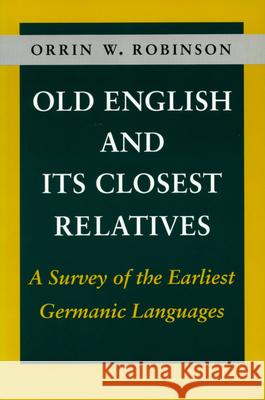Old English and Its Closest Relatives: A Survey of the Earliest Germanic Languages » książka
Old English and Its Closest Relatives: A Survey of the Earliest Germanic Languages
ISBN-13: 9780804722216 / Angielski / Miękka / 1993 / 320 str.
Old English and Its Closest Relatives: A Survey of the Earliest Germanic Languages
ISBN-13: 9780804722216 / Angielski / Miękka / 1993 / 320 str.
(netto: 115,85 VAT: 5%)
Najniższa cena z 30 dni: 115,83 zł
ok. 30 dni roboczych
Bez gwarancji dostawy przed świętami
Darmowa dostawa!
At first glance, there may seem little reason to think of English and German as variant forms of a single language. There are enormous differences between the two in pronunciation, vocabulary, and grammar, and a monolingual speaker of one cannot understand the other at all. Yet modern English and German have many points in common, and if we go back to the earliest texts available in the two languages, the similarities are even more notable. How do we account for these similarities? The generally accepted explanation is that English and German are divergent continuations of a common ancestor, a Germanic language now lost. This book surveys the linguistic and cultural backgrounds of the earliest kown Germanic languages, members of what has traditionally been known as the English family tree: Gothic, Old Norse, Old Saxon, Old English, Old Frisian, Old Low Franconian, and Old High German. For each language, the author provides a brief history of the people who spoke it, an overview of the important texts in the language, sample passages with full glossary and word-by-word translations, a section on orthography and grammar, and discussion of linguistic or philological topics relevant to all the early Germanic languaes but best exemplified by the particular language under consideration. These topics inclued the pronunciation of older languages; the runic inscriptions; Germanic alliterative pietry; historical syntax, borrowing, analogy, and drift; textual transmission; and dialect variation.











